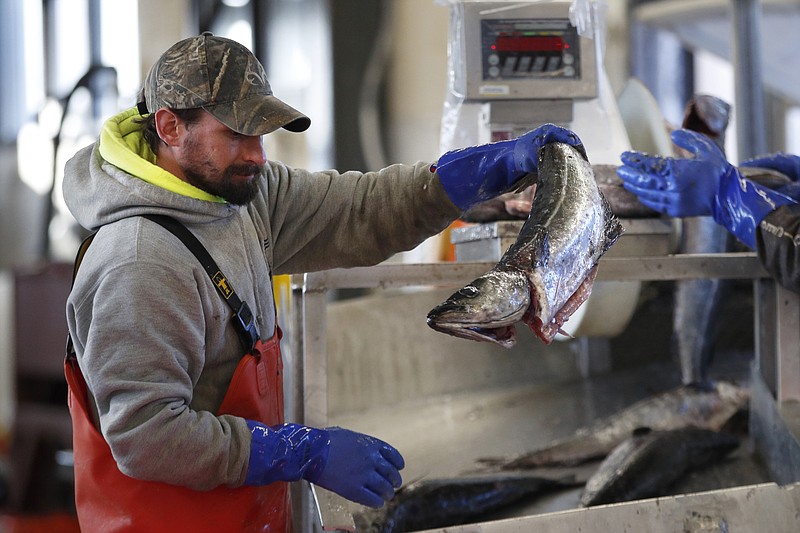PORTLAND, Maine -- The coronavirus pandemic has hurt the U.S. seafood industry due to a precipitous fall in imports and exports and a drop in catch of some species.
Those are the findings of a group of scientists who sought to quantify the damage of the pandemic on America's seafood business, which has also suffered in part because of its reliance on restaurant sales. Consumer demand for seafood at restaurants dropped by more than 70% during the early months of the pandemic, according to the scientists, who published their findings recently in the scientific journal Fish and Fisheries.
Imports fell about 37% and exports about 43% over the first nine months of the year compared with 2019, the study said. The economic impact has been felt most severely in states that rely heavily on the seafood sector, such as Maine, Alaska and Louisiana, said Easton White, a University of Vermont biologist and the study's lead author.
It hasn't all been doom and gloom for the industry, as seafood delivery and home cooking have helped businesses weather the pandemic, White said. The industry will be in a better position to rebound after the pandemic if domestic consumers take more of an interest in fresh seafood, he said.
"Shifting to these local markets is something that could be really helpful for recovery purposes," White said. "The way forward is to focus on shortening the supply chain a little bit."
The study found that Alaska's catch of halibut, a high-value fish, declined by 40% compared with the previous year through June. Statistics for many U.S. fisheries won't be available until next year, but those findings dovetail with what many fishermen are seeing on the water.
Maine's catch of monkfish has dried up because of the lack of access to foreign markets such as South Korea, said Ben Martens, executive director of the Maine Coast Fishermen's Association.
"The prices just went so low, they couldn't build a business doing that this year," Martens said.
The study confirms what members of the seafood industry have been hearing for months, said Kyle Foley, senior program manager for the seafood program at Gulf of Maine Research Institute. Foley, who was not involved in the study, said the findings make clear that the seafood industry needs more help from the federal government.
The federal government allocated $300 million in Coronavirus Aid, Relief, and Economic Security Act dollars to the seafood industry in May. The government announced $16 billion for farmers and ranchers that same month.
"It helps to make the case for why there's a need for more relief, which I think is our industry's biggest concern across the supply chain in seafood," Foley said.
The study concludes that "only time will tell the full extent of covid-19 on U.S. fishing and seafood industries." Gavin Gibbons, a spokesman for the National Fisheries Institute in McLean, Va., said the short-term findings reflect the difficulties the industry has experienced this year.
"The closure of restaurant dining has had a disproportionate effect on seafood and a pivot to retail has not made up for all of the lost sales," Gibbons said.
TRUMP AND LOBSTERS
At the same time New England's lobstermen say politics and trade policies have also taken a toll on their livelihood.
President Donald Trump positioned himself as a friend of the lobster industry, but members of the industry said they are looking forward to something that has been lacking in the crustacean business: stability.
Trump's trade war with China led to a rocky few years for the industry, which is based mostly in Maine. Trump, who campaigned hard in Maine and won an electoral vote in the state, touted economic aid and environmental policy changes intended to benefit the business. The Republican Party even had Maine lobsterman Jason Joyce speak at its national convention.
What the industry really needs is assurance that it will be able to sell lobsters to other countries without punitive tariffs, said Stephanie Nadeau, owner of The Lobster Company, an Arundel, Maine, dealer. She and others said they are hopeful that assurance will arrive under Democratic President-elect Joe Biden.
"You can't plan. You can't live in chaos," she said. "The trade war, was it going to last a week, was it going to last a month, was it going to last four years? How do you operate around that?"
SEEKING STABILITY
U.S. lobster exports to China, a major buyer of seafood, fell off a cliff after the Trump administration escalated trade hostilities. That led to heavy tariffs on U.S. lobsters, and exporters saw a drop of more than 80% in the first half of 2019.
Then, this summer, Trump directed the U.S. Department of Agriculture to provide lobster fishermen with financial assistance to make up for lost income from the Chinese tariffs. He also brokered a new deal with China, which agreed to start buying U.S. lobster again.
It was a whipsaw of a time for an industry that is already used to dealing with uncertainty because of issues such as the fluctuating volume of catch, dangerous weather and the changing prices of bait and fuel.
The impending presidency of Biden represents a chance at steadiness, said John Sackton, a longtime industry analyst and founder of SeafoodNews.com.
"I think Biden, by taking people back to more normalcy and tackling the virus, could potentially put things back to normal, which would be very favorable for the U.S. industry," he said. "Chaos is the enemy of the lobster industry."
